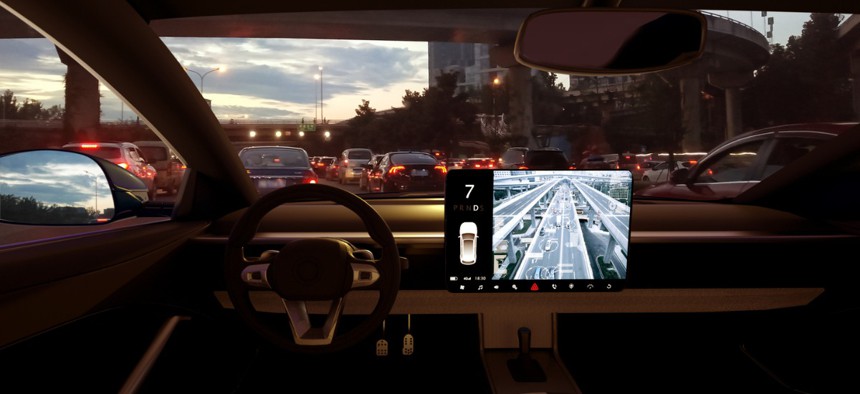Pentagon Experiments with Self-Driving Shuttles at San Diego Military Base

4X-image/istockphoto
The real-world testing will provide new insight into varying emerging technologies.
Driverless technology provider Robotic Research and Verizon Public Sector on Wednesday confirmed their cooperative involvement in a pilot project to explore the use of autonomous shuttles at the Marine Corps Air Station, or MCAS, Miramar’s 5G Living Lab in San Diego.
NavalX SoCal Tech Bridge, US Ignite and Local Motors are also involved in this 90-day experiment with self-moving shuttles to transport people and packages around the military installation.
“This pilot is one example of how 5G-enabled applications carry the potential of enhancing operational effectiveness,” Verizon’s Senior Vice President of Public Sector Jennifer Chronis told Nextgov Wednesday.
The announcement comes almost a year after Verizon and MCAS Miramar unveiled their plans to deploy the former’s 5G Ultra Wideband on a military base for the very first time. Working with a range of strategic partners, they’ve since started to demonstrate 5G-enabled innovations across artificial intelligence, self-driving vehicles and drones in real-world scenarios at the living lab. Broadly, those involved are assessing the benefits such next-generation wireless capabilities can bring to public safety, commerce and energy management.
“Working in conjunction with our partners in the Marine Corps at Miramar, we have created a true testbed for innovation—innovation that will have tremendous impact within the Department of Defense and across the public sector,” Chronis said.
This endeavor is new, but Chronis added that Robotic Research’s “commitment to MCAS Miramar began far before this pilot.” The company has been providing the Pentagon with autonomous technology solutions for nearly 20 years. In particular, she noted it specializes in “platform-agnostic autonomy,” enabling the automation of “a wide variety of platforms for both government and commercial customers.” In 2017, the Maryland-based company became the Autonomy Strategic Partner for the Marine Corps autonomous proving grounds at MCAS Miramar.
“This initial partnership led to additional collaboration focused on the use of autonomous technology on both the battlefield and installations,” Chronis said. “Current efforts include the unmanned logistics systems prototype being developed as well as the trial of low-speed autonomous shuttles doing package delivery on base.”
Through this fresh pilot, Robotic Research’s AutoDrive autonomy kit provides the self-driving capabilities of Local Motors’ autonomous shuttle, Olli, rolling through the military installation. Verizon’s 5G will transmit the heaps of system and sensor data collected by the shuttle back to a storage service, which is also provided by Robotic Research.
“Understanding the operational needs of our partners in the Marine Corps is a top priority,” Chronis noted, “and learning how 5G UWB, in conjunction with autonomous vehicle technology and real-time sensor data, can be leveraged to make package delivery more efficient across multiple scenarios—from tools to the flight line, to mail delivery, to product for retail environments—is a step forward in addressing the digital transformation needs at Miramar, and beyond.”
Generally, autonomous shuttles currently operate with an onboard safety operator. But one element the partners mentioned exploring in this project includes approaches where one person monitors a single fleet remotely, from a centralized location.
Verizon and Robotic Research are slated to showcase some of what’s to come during the Electric Mobility Symposium at MCAS Miramar on June 24.






